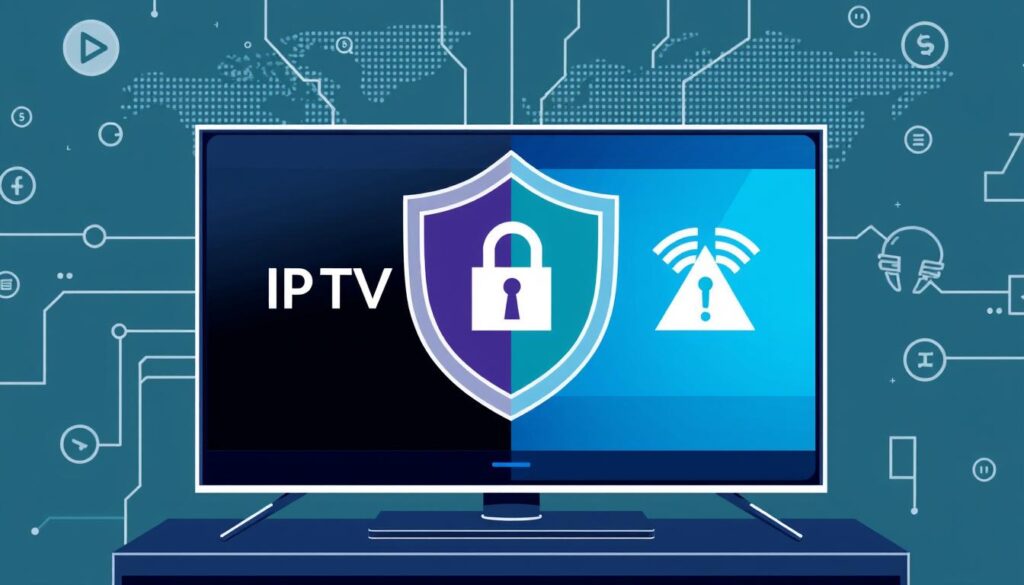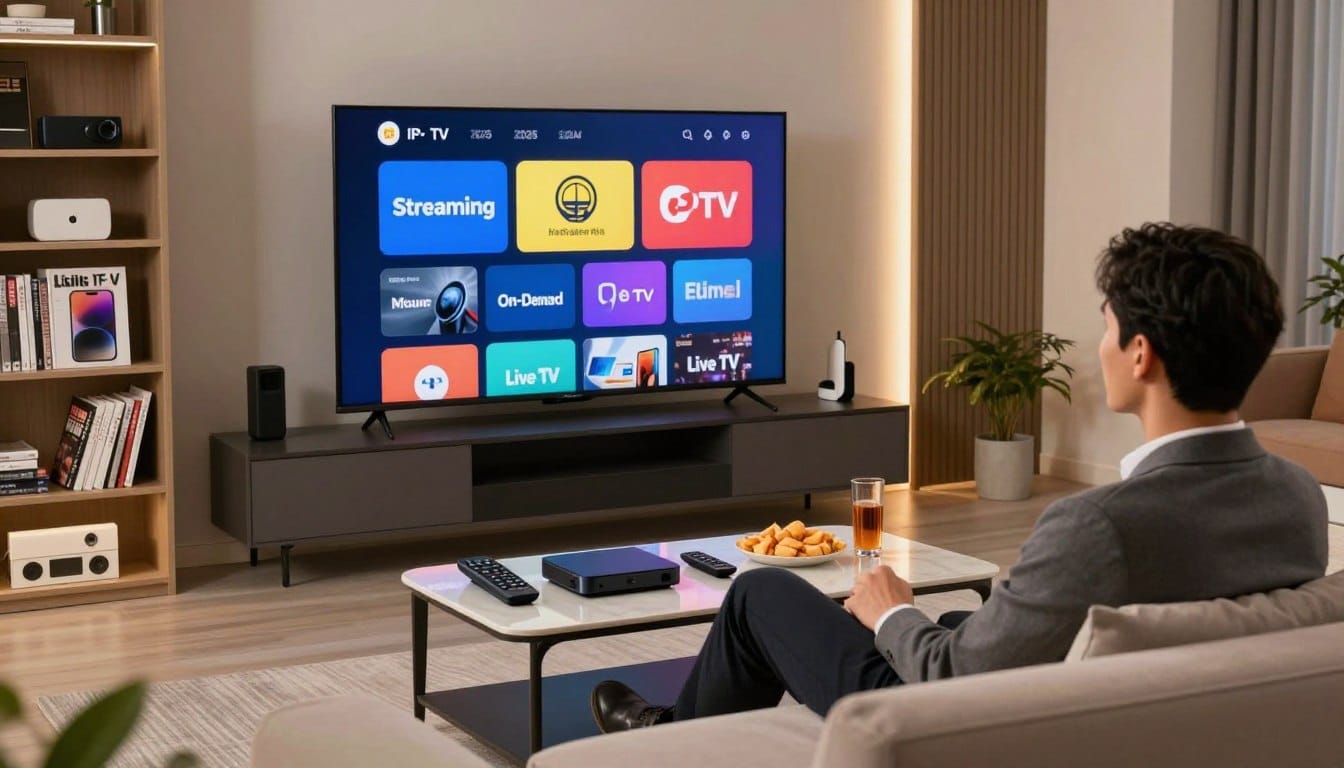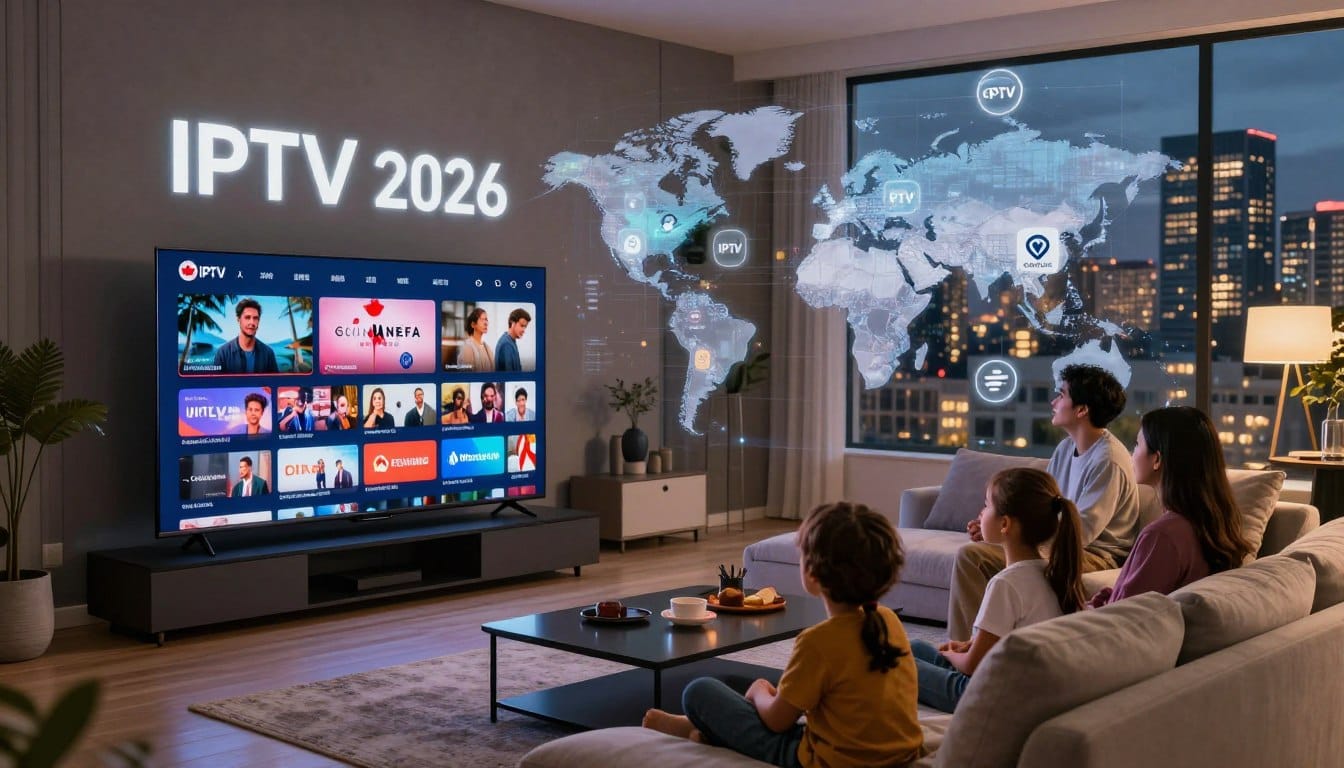Streaming your favorite shows and movies with IPTV has become a popular choice for entertainment. However, with the rise of IPTV streaming, concerns about online security and privacy have also grown.
Using a VPN for IPTV can help protect your online activity from being monitored or restricted. With a VPN, you can enjoy a more secure and private IPTV service, accessing your favorite content without worrying about geo-restrictions or data breaches.
But do you need a VPN for IPTV? The answer depends on several factors, including your online habits and the level of security you require.
Key Takeaways
- Using a VPN with IPTV enhances online security and privacy.
- A VPN helps bypass geo-restrictions for IPTV streaming.
- IPTV service providers may recommend using a VPN for secure streaming.
- A VPN can protect your data from being monitored or intercepted.
- Choosing the right VPN is crucial for a seamless IPTV experience.
Understanding IPTV: What It Is and How It Works
IPTV, or Internet Protocol Television, is revolutionizing the way Canadians consume television content. This technology allows users to stream television content over the internet, rather than through traditional satellite or cable formats.

The Basics of IPTV Technology
IPTV uses a broadband internet connection to deliver TV content, allowing for a more personalized and interactive viewing experience. This is achieved by using a set-top box or other devices that can decode the IPTV signal, providing access to a wide range of channels and on-demand content.
Different Types of IPTV Services
There are several types of IPTV services available, including live TV, video on demand (VOD), and catch-up TV. Live TV allows users to watch programs as they are broadcast, while VOD services enable viewers to select and watch content at their convenience. Catch-up TV services allow users to watch previously aired content.
The Growing Popularity of IPTV in Canada
IPTV is gaining popularity in Canada due to its flexibility and the wide range of content it offers. Canadian IPTV users can access a variety of channels and services, including international content that may not be available through traditional TV providers. As internet speeds continue to improve across the country, the appeal of IPTV is likely to grow.
Common Challenges IPTV Users Face
As IPTV continues to grow in popularity, users are confronted with various issues that can impact their streaming experience. IPTV users in Canada and worldwide face several common challenges that can be frustrating and affect their enjoyment of the service.
Geo-Restrictions and Content Blocking
One of the significant challenges IPTV users encounter is geo-restrictions and content blocking. Many IPTV services are restricted to specific geographic regions, and users may find that certain content is not available in their area. This can be due to licensing agreements or other copyright restrictions. For instance, a user in Canada might not be able to access certain sports channels or TV shows because of geo-blocking.
Key issues with geo-restrictions include:
- Content availability varies by region
- Licensing agreements restrict access
- Users may be unable to access desired content
ISP Throttling and Bandwidth Limitations
Another challenge IPTV users face is ISP throttling and bandwidth limitations. Some Internet Service Providers (ISPs) intentionally slow down (throttle) internet traffic to IPTV services, leading to buffering, lag, and poor streaming quality. Bandwidth limitations can also affect the number of devices that can stream IPTV content simultaneously.
Common problems associated with ISP throttling include:
- Reduced streaming quality
- Increased buffering and lag
- Restrictions on simultaneous device usage
Privacy and Security Concerns
IPTV users also need to be aware of privacy and security concerns. When streaming IPTV content, users may be vulnerable to data breaches, hacking, and other cyber threats. Without proper security measures, IPTV users may expose their personal data and online activities to potential risks.

- Use a reputable VPN service
- Keep their IPTV devices and software up to date
- Be cautious when sharing personal data online
VPN Fundamentals: Protection for Your Online Activities
A VPN is a service that allows you to connect to the internet securely by routing your connection through a server and encrypting your data. This fundamental concept is crucial in understanding how VPNs protect your online activities.
How VPNs Work to Secure Your Connection
VPNs work by creating a secure tunnel between your device and a VPN server. When you connect to a VPN, your internet traffic is encrypted, making it difficult for hackers or third parties to intercept your data. This encryption ensures that your online activities remain private and secure.
Key Features of Quality VPN Services
When selecting a VPN service, there are several key features to look for. These include strong encryption protocols, a no-logs policy, and a wide range of server locations. A quality VPN service should also offer reliable customer support and be compatible with various devices.
VPN Usage in Canada: Legal Considerations
In Canada, using a VPN is legal. However, it’s essential to understand that while VPNs can protect your privacy, they are not a tool for illegal activities. Canadians should be aware of the laws regarding online activities and ensure their VPN usage complies with these laws.
By understanding VPN fundamentals and choosing a reputable VPN service, Canadians can enhance their online security and privacy while enjoying their IPTV services.
Do I Need a VPN for IPTV? Analyzing the Necessity
The decision to use a VPN with IPTV depends on several factors that can significantly impact your viewing experience. IPTV, or Internet Protocol Television, has become a popular method for streaming content, but it comes with its own set of challenges, such as geo-restrictions and ISP throttling. A VPN can potentially address these issues, but it’s essential to understand when it’s truly necessary.
Scenarios Where a VPN Is Essential for IPTV
There are specific scenarios where using a VPN with IPTV is not just beneficial but necessary. For instance, if you’re trying to access geo-restricted content, a VPN can mask your IP address, making it appear as though you’re accessing the content from a different location. This is particularly useful for users who want to watch international channels or content not available in their region. Additionally, a VPN can help prevent ISP throttling, which can significantly reduce your streaming quality.
Another critical scenario is when you’re concerned about your privacy. IPTV streaming can expose your viewing habits to your ISP, but a VPN encrypts your internet traffic, ensuring that your activities remain private. This is especially important for users who value their online privacy and want to keep their streaming habits confidential.
When You Might Not Need a VPN for IPTV
Not all IPTV users need a VPN. If you’re only accessing content that is readily available in your region and aren’t concerned about ISP throttling or privacy, you might not need a VPN. Additionally, some IPTV services might not work well with VPNs due to compatibility issues or the VPN’s inability to bypass geo-restrictions effectively.
Making the Decision Based on Your Specific Needs
To decide whether you need a VPN for IPTV, consider your specific viewing habits and requirements. Ask yourself if you’re accessing geo-restricted content, if you’re concerned about privacy, or if you’re experiencing ISP throttling. If you answered yes to any of these, a VPN could be beneficial. It’s also worth considering the quality of the VPN service, as a reliable VPN will provide better performance and more features that can enhance your IPTV experience.
Benefits of Using a VPN with Your IPTV Service
For IPTV enthusiasts, a VPN is more than just a tool – it’s a gateway to a more enjoyable and secure streaming experience. By encrypting your internet connection, a VPN provides a secure and private pathway for your IPTV streams, shielding your online activities from unwanted surveillance and interference.
Bypassing Geographic Content Restrictions
One of the significant benefits of using a VPN with IPTV is the ability to bypass geo-restrictions. Many IPTV services are restricted to specific geographic locations, but a VPN allows you to mask your IP address, making it appear as though you’re accessing the service from an allowed region. This opens up a world of content that’s otherwise inaccessible due to geographical constraints.
Preventing ISP Throttling for Smoother Streaming
ISPs often throttle bandwidth for heavy internet users, including those streaming IPTV content. By using a VPN, you can avoid ISP throttling, ensuring a smoother and more consistent streaming experience. Since your ISP can’t monitor your activities, they can’t throttle your connection based on the type of content you’re streaming.
Enhanced Privacy and Security While Streaming
A VPN not only helps in bypassing restrictions but also enhances your privacy and security while streaming IPTV. By encrypting your data, a VPN protects you from hackers and snoops, ensuring that your viewing habits remain private.
Protection from Monitoring and Data Collection
With a VPN, you’re safeguarded against monitoring and data collection by third parties, including your ISP. This means your IPTV streaming activities remain confidential, free from targeted ads and data profiling.
In conclusion, integrating a VPN with your IPTV service offers a multitude of benefits, from accessing geo-restricted content to enjoying a more secure and private streaming experience. As highlighted by a recent quote, “A VPN is essential for anyone serious about their online security and freedom.”
“A VPN is essential for anyone serious about their online security and freedom.”
Potential Drawbacks of VPNs for IPTV Streaming
While VPNs can significantly enhance your IPTV streaming experience, there are several potential drawbacks to consider. As with any technology, using a VPN for IPTV comes with its own set of challenges that can impact your overall viewing experience.
Impact on Connection Speed and Performance
One of the primary concerns when using a VPN with IPTV is the potential impact on your connection speed. VPNs can sometimes cause a reduction in internet speed due to the encryption process and the distance between your device and the VPN server. This can lead to buffering issues or lower video quality. To mitigate this, it’s essential to choose a VPN with a strong network infrastructure and servers optimized for streaming.
Compatibility Issues with Certain IPTV Services
Some IPTV services may not be compatible with certain VPNs, or they might actively block VPN traffic. This can result in your IPTV service not working properly or being unable to access certain content. It’s crucial to select a VPN that is known to work well with your IPTV service. Checking for compatibility before committing to a VPN is a wise step.
Additional Costs and Subscription Considerations
Using a VPN for IPTV can also incur additional costs. While some VPNs offer affordable plans, high-quality VPN services that are optimized for streaming may come at a premium. It’s essential to weigh the benefits against the costs and consider whether the additional expense is justified for your IPTV needs. Some VPNs also offer money-back guarantees, allowing you to test their service risk-free.
Choosing the Right VPN for IPTV Streaming
To enjoy IPTV streaming without interruptions, it’s essential to pick a VPN that meets your needs. With the increasing popularity of IPTV services in Canada, selecting a VPN that can bypass geo-restrictions, prevent ISP throttling, and ensure your privacy is crucial.
Essential Features for IPTV-Friendly VPNs
When choosing a VPN for IPTV streaming, there are several key features to consider. First, the VPN should have a large server network to ensure you can find a reliable connection. Fast connection speeds are also vital to prevent buffering and lag. Additionally, the VPN should support multiple device connections to protect all your streaming devices.
Another critical feature is the VPN’s ability to bypass geo-restrictions. Look for VPNs with dedicated IP addresses or those known for their ability to unblock streaming services. Strong encryption and a no-logs policy are also essential to maintain your privacy and security while streaming.
Top VPN Options Optimized for Streaming
Several VPNs stand out for their performance in IPTV streaming. ExpressVPN is known for its fast speeds and extensive server network, making it an excellent choice. NordVPN offers dedicated servers for streaming and a large network of servers worldwide. Surfshark is another strong contender, offering unlimited device connections and a user-friendly interface.
| VPN Provider | Server Network | Speed | Device Connections |
|---|---|---|---|
| ExpressVPN | 3000+ servers in 94 countries | Fast | Up to 8 devices |
| NordVPN | 5500+ servers in 60 countries | Fast | Up to 6 devices |
| Surfshark | 3200+ servers in 65 countries | Fast | Unlimited |
Factors to Consider for Canadian IPTV Users
For Canadian IPTV users, it’s essential to choose a VPN that understands the local market and can effectively bypass geo-restrictions on Canadian streaming services. Consider VPNs with servers located in Canada or those known for their ability to unblock Canadian content. Additionally, ensure the VPN is compatible with your IPTV device, whether it’s a smart TV, Amazon Fire TV, or Android box.
By considering these factors and choosing a VPN that meets your IPTV streaming needs, you can enjoy a seamless and secure viewing experience.
Setting Up Your VPN with Different IPTV Devices
IPTV users can benefit from a VPN by following a few simple setup steps on their devices. Configuring a VPN enhances streaming security and helps bypass geo-restrictions. The process varies slightly depending on the device you’re using.
VPN Configuration on Smart TVs
Setting up a VPN on a Smart TV can be straightforward if your TV supports VPN configuration. Some Smart TVs allow you to configure VPN settings directly in their network settings menu. For others, you might need to use a VPN-enabled router or a streaming device with VPN capabilities.
- Check if your Smart TV supports VPN configuration.
- Enter your VPN details into the network settings.
- Alternatively, use a VPN-enabled router or streaming device.
Using VPNs with Amazon Fire TV and Firestick
Amazon Fire TV and Firestick users can easily install VPN apps directly from the Amazon Appstore. Popular VPN providers like ExpressVPN and NordVPN offer dedicated apps for Fire TV.
- Download and install the VPN app from the Amazon Appstore.
- Launch the VPN app and log in with your credentials.
- Connect to your preferred VPN server.
VPN Setup on Android Boxes and Other IPTV Devices
For Android Boxes and other IPTV devices, you can often set up a VPN directly in the device’s network settings or by installing a VPN app if available.
Steps to configure VPN on Android Box:
- Go to the device’s network settings.
- Select the network you’re connected to.
- Enter your VPN details to establish a connection.
Troubleshooting Common Setup Issues
If you encounter issues during VPN setup, check your VPN credentials, ensure your device is connected to the internet, and try restarting your device. Common issues include connection drops or failure to connect to the VPN server.
| Device | VPN Setup Method | Common Issues |
|---|---|---|
| Smart TV | Network Settings or VPN-enabled Router | Compatibility issues, configuration errors |
| Amazon Fire TV/Firestick | VPN App from Amazon Appstore | App installation issues, login problems |
| Android Box | Network Settings or VPN App | Configuration errors, connection drops |
Optimizing Your IPTV Experience with a VPN
A VPN can be a game-changer for IPTV users, offering a more secure and private streaming experience. To truly optimize your IPTV experience, you need to consider a few key factors when using a VPN.
Server Selection for Best Performance
Choosing the right VPN server is crucial for optimal IPTV streaming. Look for servers that are specifically optimized for streaming and are located in regions that offer the content you want to watch. Some VPN providers offer dedicated servers for streaming, which can significantly improve your viewing experience.
| Server Location | Streaming Speed | Content Availability |
|---|---|---|
| US | High | Wide range of US content |
| Canada | High | Canadian content and some US content |
| UK | Medium | UK and some European content |
Adjusting VPN Settings to Reduce Buffering
Buffering can be a significant issue when streaming IPTV over a VPN. To minimize this, you can try adjusting your VPN settings. Using a VPN protocol that prioritizes speed, such as UDP, can help reduce buffering. Additionally, ensuring that your internet connection is stable and fast enough for streaming is crucial.
Balancing Security and Streaming Quality
While security is a top priority when using a VPN, it’s also important to balance this with streaming quality. Some VPNs offer features that allow you to adjust the level of encryption, which can impact streaming speed. Finding the right balance is key to a smooth IPTV experience.
Advanced Tips for Power Users
For advanced users, configuring your VPN to use a split tunneling setup can further optimize your IPTV experience. This allows you to route your IPTV traffic through the VPN while other internet activities use your regular connection.
By following these tips, you can significantly enhance your IPTV experience when using a VPN, ensuring a secure, private, and high-quality streaming experience.
Conclusion: Making an Informed Decision About VPNs and IPTV
Using a VPN with your IPTV service can significantly enhance your streaming experience. By understanding the benefits and potential drawbacks, you can make an informed decision about whether a VPN is right for you.
A VPN for IPTV streaming can help bypass geo-restrictions, prevent ISP throttling, and enhance your online security. When choosing a VPN, consider factors such as server locations, connection speed, and compatibility with your IPTV device.
Canadian IPTV users can particularly benefit from using a VPN, as it allows access to a broader range of content and helps maintain a stable streaming connection. By selecting the right VPN and configuring it correctly, you can optimize your IPTV experience.
Making an informed decision about using a VPN with your IPTV service involves weighing the advantages and potential limitations. With the right information, you can enjoy a more secure, flexible, and enjoyable IPTV experience.
FAQ
What is IPTV and how does it work?
IPTV, or Internet Protocol Television, is a service that delivers television content over the internet. It works by streaming content directly to your device, allowing you to watch TV shows, movies, and other content in real-time or on-demand.
Why do I need a VPN for IPTV?
Using a VPN with IPTV can help bypass geo-restrictions, prevent ISP throttling, and enhance your privacy and security while streaming. A VPN can also help you access international content and optimize your streaming experience.
Will using a VPN slow down my IPTV streaming?
A VPN can potentially impact your connection speed, but many modern VPNs are optimized for streaming and have minimal impact on performance. You can also adjust your VPN settings to reduce buffering and optimize your streaming experience.
Can I use a VPN with my smart TV or IPTV box?
Yes, you can use a VPN with many smart TVs and IPTV boxes. Some VPNs have dedicated apps for popular devices like Amazon Fire TV and Firestick, while others may require manual configuration.
Is it legal to use a VPN with IPTV in Canada?
Yes, using a VPN is legal in Canada. However, it’s essential to use your VPN for legitimate purposes, such as enhancing your streaming experience and protecting your online activity, rather than for accessing pirated content.
How do I choose the best VPN for IPTV streaming?
When choosing a VPN for IPTV, look for services with optimized servers for streaming, a strong network of servers across the globe, and features like encryption and a no-logs policy. You should also consider the VPN’s compatibility with your IPTV device and its customer support.
Can a VPN help me avoid ISP throttling?
Yes, a VPN can help you avoid ISP throttling by encrypting your online activity and hiding your IP address. This makes it more difficult for your ISP to detect that you’re streaming IPTV content and throttle your connection.
What are the benefits of using a VPN with my IPTV service?
Using a VPN with IPTV can provide several benefits, including bypassing geo-restrictions, preventing ISP throttling, and enhancing your privacy and security while streaming. A VPN can also help you access international content and optimize your streaming experience.




